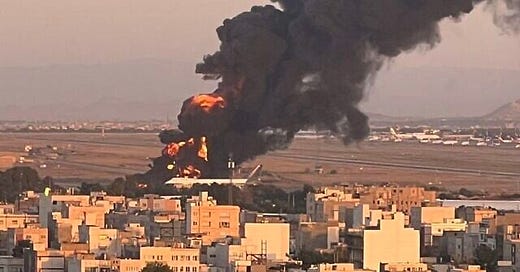In “most distant strike,” Israeli Air Force bombs Iranian plane at Mashhad Airport in northeastern Iran. (The Times of Israel)
After another night of air-raid sirens, with Iranian ballistic missiles crashing into residential buildings—the casualty count so far is eight dead, including a man in his 80s pulled out of the rubble of a building, and hundreds hospitalized — this Monday morning brought the news that:
The US Air Force appears to be in the midst of an unprecedented mass deployment of aerial refueling tankers across the Atlantic Ocean from bases in the US, amid the ongoing Israel-Iran war.
The number of KC-135 and KC-46 tankers continued to rise, with at least 30 moved east in the late hours of Sunday, according to flight tracking data.
Such tankers are required to refuel aircraft participating in strikes far away from their home country, such as the Israeli jets hitting Iran.
There have been no reports of refueling problems for those Israeli jets now hitting Iran; Israel has its own refueling tankers. Early in April, though, the US moved powerful strategic bombers to Diego Garcia in the Indian Ocean, within striking distance of Iran.
On Sunday, asked whether Israeli Prime Minister Netanyahu had asked him to get the US more involved in the war, President Trump replied, "We're not involved in it. It's possible we could get involved. But we are not at this moment involved."
It’s possible to tentatively link the second sentence of that terse reply to the news about the US refuelers being moved toward the region.
Much of the Israeli news discourse in the last few days has centered on the question of possible US involvement — and particularly regarding Iran’s Fordo nuclear facility. Israel has already started bombing Fordo by itself, with “limited damage” reported this morning.
Fordo, however, is dug so deep inside a mountain that it’s considered outside the range of Israel’s fighter jets — but not outside the range of the sort of bombers deployed at Diego Garcia, which can carry immensely powerful, exclusively made-in-America bunker-busters.
The cardinal purpose of the war on the Iranian regime that Israel launched on Friday is to prevent it from going nuclear. Assessments of how much damage Israel has inflicted so far on Iran’s nuclear program — by bombing its Natanz, Isfahan, Fordo, and Parchin facilities, assassinating many of its nuclear scientists, and other measures — vary.
Clearly, though, Iran’s nuke program is still far from kaput, and demolishing it — even for a significant period of time —is seen as impossible as long as Fordo still stands.
More broadly, the ayatollah regime — with the Israeli air force in control of its skies and raining fire on its facilities and top military and intelligence officials, its proxy terror groups neutralized and feeble, its economy in a shambles, and its population full of contempt toward it — has never been in a weaker state, and for the US not to make the most of this moment and, in tandem with Israel, put a final end not only to the nuke program but to the regime itself, would be an instance of strategic insanity.
It would not require anything approaching a “forever war,” as proclaimed by the isolationist advisers Trump has unfortunately surrounded himself with. In a heterogeneous country with rock-bottom morale, Iran’s ground forces and aged air force have long been irrelevant; its strategy has been to project power through its proxy forces, ballistic missiles, and prospective nukes. It is no match at all for a combined US–Israeli offensive.
Thanks to the window that Israel’s campaign has opened, the time when the world can finally be rid of this dire, malevolent regime, to be replaced by real possibilities of a more peaceful Middle East and beyond, is now.






Iran getting nukes should be everyone's concern.
Those crazies aren't fixed in the real world.
Their "god" Satan would happily release nukes on anyone who doesn't support their god Satan